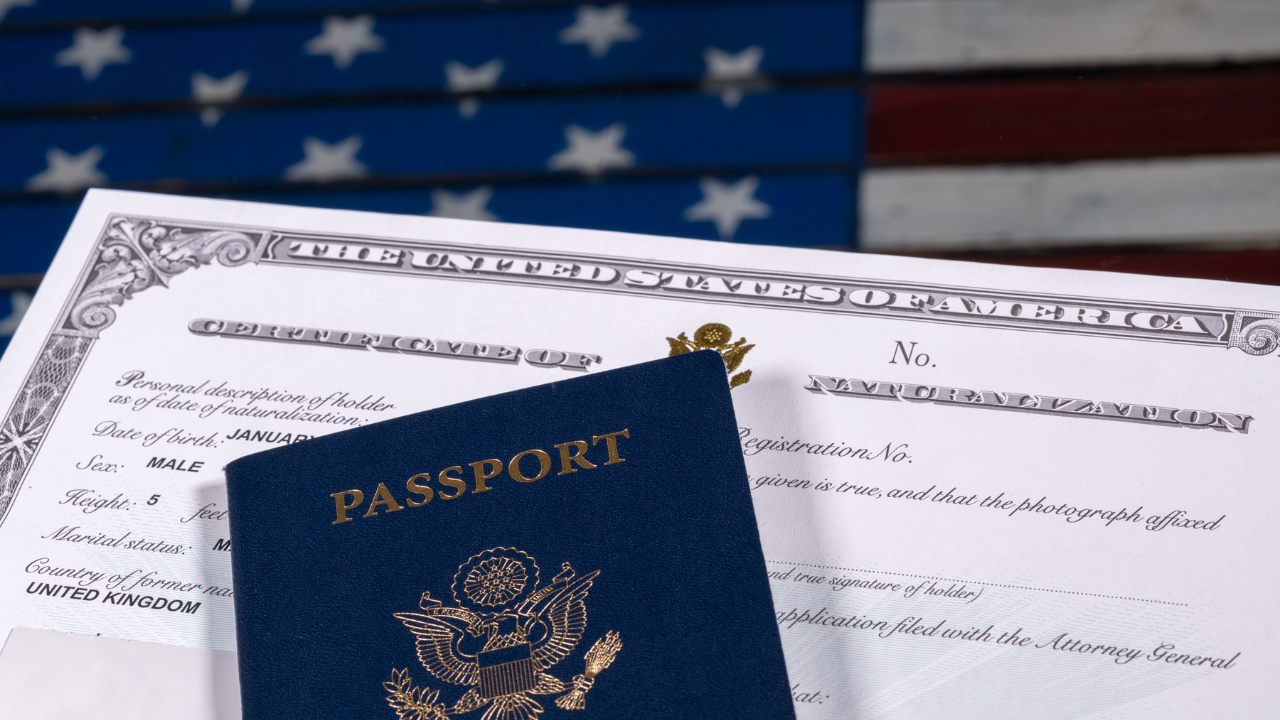
US citizenship provides you with the highest level of rights and privileges in the United States. Its goal is to create a unique bond between those who achieve this status, uniting them through a common ground of newly adopted rights, freedoms, and civic ideals. All of which are guaranteed by the US Constitution.Depending on your situation, there are a variety of ways you can obtain citizenship. This article will focus primarily on the topic of Naturalization, which is one of the ways people born outside of the US can become citizens. To become a US citizen through naturalization you must meet several requirements. Here we will discuss eligibility requirements for naturalization, the time and cost associated with naturalization, and the steps you’ll have to go through to become a US citizen.
Related: Citizenship & Naturalization
USCIS defines naturalization as “the process by which U.S. citizenship is granted to a lawful permanent resident after meeting the requirements established by Congress in the Immigration and Nationality Act”. The eligibility requirements to become a US citizen will vary depending on the reason/category under which a person is requesting to naturalize. Below we discuss in detail the eligibility requirements.
The following is a list of general eligibility requirements for naturalization. Some could vary depending on the category under which the person is requesting to naturalize, but in general, the applicant must:
There are different categories of people who are eligible for filing an application for naturalization. Depending on the category under which a person is requesting to file for naturalization, the general eligibility requirements previously mentioned could vary.The following are the most common groups of immigrants who are eligible for naturalization:
Not sure if you qualify for naturalization and becoming a US citizen? Our immigration team at Agarwal Law Group can help determine your eligibility.
From the time you file your naturalization application to when it’s time to attend the oath of allegiance ceremony, the process could take approximately 12 months. The amount of time the process could take will vary greatly from state to state. You can check the USCIS processing times here https://egov.uscis.gov/processing-times/.The amount of time the naturalization process takes could vary depending on the following as well:
Having an immigration attorney assist you with your naturalization process can be a great asset. An attorney can help identify possible issues or situations that could arise during the naturalization process and help you address these, making the process less complicated, more efficient, less time-consuming, and less costly.
At the time of writing this guide, the filing fee for a naturalization application is $725 USD in total, ($640 of the N400 and $85 of the biometrics services).Applicants 75 or older do not have to pay the biometrics fee, only the $640 filing fee, and military applicants filing under sections 328 or 329 of the Immigration and Naturalization Act, do not have to pay the filing fee or the biometrics fee.Related: VAWA Eligibility Requirements [2022 Qualifications]

Next, let’s look at an overview of the naturalization process from the initial application to the oath of allegiance:
The first step in a naturalization process should always be an evaluation of your particular case to determine if you meet the eligibility requirements to be able to apply for US citizenship. It is important to determine under which category you will be submitting your naturalization application since every category has its particularities and specific requirements.Having an experienced immigration attorney review your case is an excellent strategy. They can identify possible issues, the category under which you qualify, and if it makes sense for you to apply now. Applying for naturalization, without being sure that you qualify, could be a costly decision.
The second step to applying for naturalization is filing an Application for Naturalization form with USCIS — also called Form N-400 — and paying the filing fee, unless you are exempt from paying (see above for who is exempt). You should also include all relevant evidence.This can be done in two ways: one, by creating a USCIS account and filing online, or two, by filing via regular mail. Which to use will depend on how tech-savvy you are. After filing the application, you will receive a receipt that will indicate the application has been received and the payment has been processed.
Once your application has been filed, the next step is to attend your biometrics appointment. This basically means having your picture and fingerprints taken at an application support center from USCIS. You will receive an appointment notice from USCIS indicating the date, time, and location where you have to present yourself to have your biometrics taken, along with other detailed instructions.USCIS takes your fingerprints during your naturalization application to conduct a background check. You can expect to attend a biometrics appointment about a month after filing your US citizenship application.
Your citizenship interview and exam will take place several months after you file your naturalization application. There is no way of predicting the exact amount of time it will take to process your application since it will greatly vary depending on the USCIS office having jurisdiction over your application.
During your citizenship interview, the USCIS officer will review and verify the information included in your naturalization application, as well as your immigration history. When a person applies to become a US citizen, USCIS will not only corroborate the information included in the application but will go over the person’s immigration history. This means that the officer will verify that the information provided was correct and truthful in any visa application, approval or denial, the process to become a lawful permanent resident, and any other immigration process undergone. Should there be any discrepancies, the interviewing officer could not only deny the naturalization application but could refer the case to the immigration court, depending on the circumstances.The interview will typically take place at the USCIS office with jurisdiction. In many instances, that would be the applicant’s local office.
During the interview, the USCIS officer will examine you on two particular aspects: (1) your ability to read, write, and speak English, since working knowledge of the English language is necessary, and (2) your knowledge of US government and US history (also known as the civics part of the exam).Study material is available from USCIS to help you prepare. For the English part of the test, you must read aloud one out of three sentences correctly to demonstrate an ability to read in English and you must write one out of three sentences correctly. For the civics part of the exam, you will be asked 10 questions out of a possible 100 that are available for study and must answer at least 6 correctly.If you do not pass the exam, a second interview will be scheduled, in which you will be provided a second opportunity to take the portion of the exam you failed.It is important to indicate that, under certain circumstances, you could be exempted from the English part of the exam and/or the civic portion. There are exceptions for people who have lived in the US for a particular amount of time and have reached a certain age, and for people who have medical disabilities or impairments that do not allow them to comply with the exam. Contact an experienced immigration attorney who can evaluate your case and determine if you qualify for any exceptions or accommodations.After you take the exam and undergo the interview, one of three scenarios could take place: the application is approved, the application is denied, or more information is requested so the interviewing officer can make a decision.If the application is approved, you will be scheduled to take the oath of allegiance. If it is denied, a letter indicating the decision and the reason for the denial will be sent to you. The letter will contain instructions as well if you decide to appeal the decision. You can apply again for naturalization. There is no limit to the amount of times you can apply.
You’re almost there! Upon approval of your naturalization application, you’ll attend the Oath of Allegiance ceremony — completing this step is essential: You aren’t a US citizen unless you have taken this oath.After passing your interview and exam, you’ll receive a letter with the time, date, and location of the ceremony. At the ceremony, you will receive your Certificate of Naturalization and officially be a US citizen! Once you have obtained your certificate, you can apply for your US passport.
Related: More Immigration Resources

Your naturalization journey will consist of several steps, and we can assist you in each of them as you navigate and move forward in the process of becoming a US citizen.Our immigration attorneys at Agarwal Law Group can help you:
Ready to start the naturalization process and become a US citizen? Contact us at Agarwal Law Group and get started on your naturalization journey today.
Whether you have a legal question, need to schedule a consultation, or just want to learn more about how we can help — you can count on us to respond quickly and clearly.